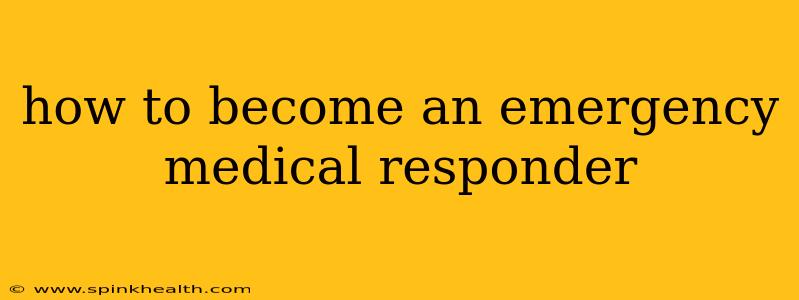How to Become an Emergency Medical Responder: A Journey to Saving Lives
The siren's wail, the rush of adrenaline, the satisfaction of providing critical care – these are just some of the elements that draw people to the challenging yet rewarding career of an Emergency Medical Responder (EMR). But the path to becoming an EMR isn't paved with smooth asphalt; it's a journey requiring dedication, training, and a genuine desire to help others in their most vulnerable moments. This guide will walk you through the steps, answering common questions along the way.
What is an Emergency Medical Responder?
An EMR is the first link in the chain of emergency medical services. They're the first responders on the scene, providing immediate, life-saving care before more advanced medical personnel arrive. Think of them as the crucial bridge between a person's emergency and definitive medical treatment. Their role often involves stabilizing patients, assessing their condition, and providing basic life support until paramedics or EMTs take over.
What are the educational requirements to become an EMR?
This is where the journey begins. The first step is to find an accredited EMR training program. These programs vary in length and curriculum, but generally include classroom instruction and hands-on practical training. The curriculum typically covers:
- Basic Anatomy and Physiology: Understanding the human body is fundamental to providing effective care.
- Medical Terminology: Learning the language of medicine is essential for clear communication.
- Trauma Care: Managing injuries resulting from accidents or violence.
- Medical Emergencies: Responding to heart attacks, strokes, seizures, and other medical emergencies.
- Airway Management: Ensuring a patient can breathe effectively.
- CPR and First Aid: Mastering these life-saving techniques is crucial.
- Patient Assessment: Quickly and accurately determining a patient's condition.
- Emergency Vehicle Operation: For some programs, this may include driving an ambulance or emergency vehicle.
H2: How long does it take to become an EMR?
The duration of an EMR program varies, but it typically ranges from a few weeks to several months, depending on the intensity of the course and the number of hours of training required.
H2: What certifications or licenses are needed to be an EMR?
Upon successful completion of the training program, you'll need to pass a certification exam. This exam assesses your knowledge and skills in providing emergency medical care. Certification is usually provided by a nationally recognized organization. Some states or regions may also require additional licensing or registration. Always check with your local EMS authority for specific requirements.
H2: What are the job prospects for EMRs?
The demand for EMRs is consistently high, given the ever-present need for immediate emergency medical response. Employment opportunities exist with:
- Fire departments: Many fire departments incorporate EMRs into their teams.
- Ambulance services: Private and public ambulance services often employ EMRs.
- Hospitals: Hospitals may use EMRs for various roles, including transporting patients.
- Event medical services: Large-scale events like concerts or sporting events frequently require EMRs.
H2: What are the potential career advancements after becoming an EMR?
Becoming an EMR is often a stepping stone to more advanced roles within the EMS system. Many EMRs choose to further their education and become Emergency Medical Technicians (EMTs) or Paramedics, gaining increased skills and responsibilities.
Becoming an EMR is a commitment, a calling, and a journey of continuous learning. It's a career where you'll witness both the worst and the best of humanity, and in doing so, you'll find a deep sense of purpose and personal fulfillment. If you're ready for the challenge, and you possess the empathy and dedication required, then the path to becoming an EMR awaits. Begin by researching accredited programs in your area and start your journey toward making a real difference in the lives of others.

